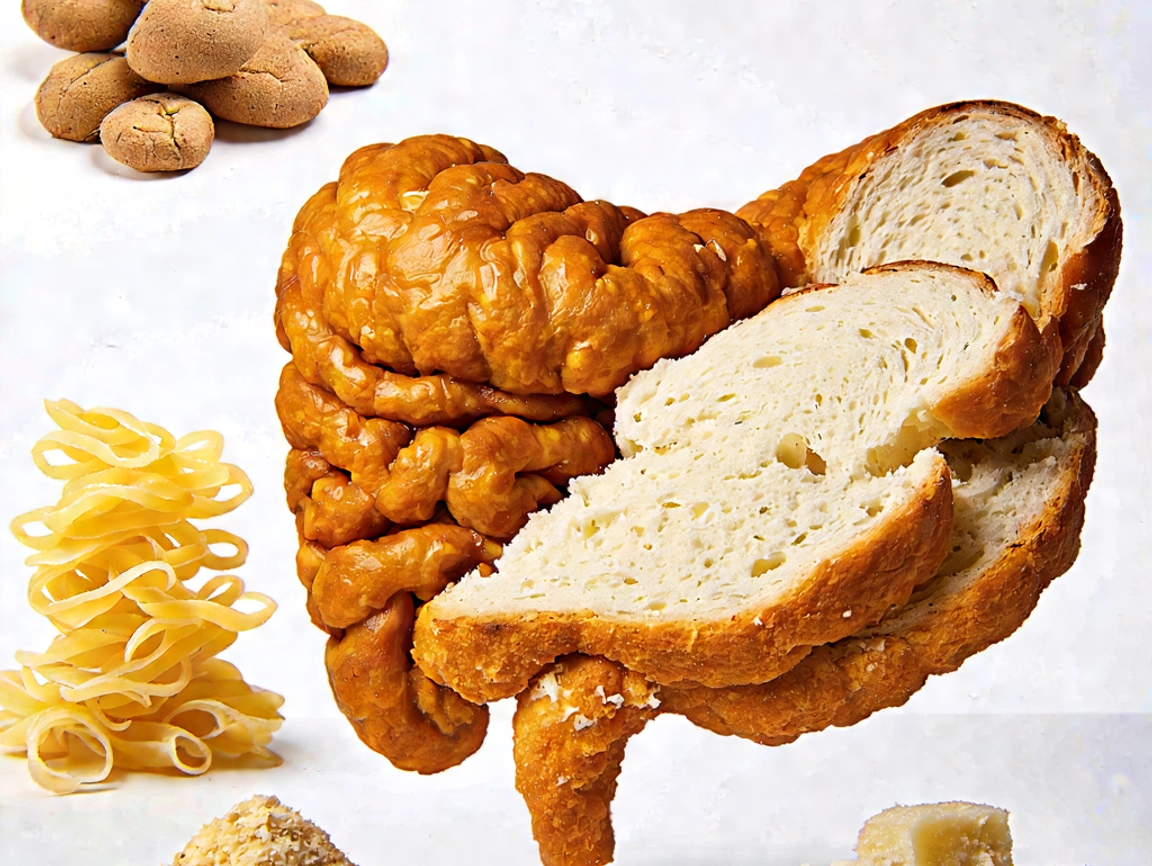In recent years, the health-conscious community has increasingly turned its focus toward gut health, and with good reason. Our gut is often referred to as the “second brain” due to its essential role in overall well-being, from digestion to immune function. However, one dietary component that has raised concerns when it comes to gut health is refined flour, particularly its gluten content. Let’s explore how refined flour, including gluten, impacts gut health and why it might be worth reconsidering your consumption.
What is Refined Flour?
Refined flour, also known as white flour, is a highly processed form of wheat flour where the bran and germ are removed during milling. This process strips away valuable nutrients, leaving behind a starchy endosperm. Refined flour is often found in bread, pastries, pasta, and other processed foods. While it provides a quick source of energy, the long-term effects of consuming large amounts can be concerning, especially when it comes to gut health.
The Role of Gluten
Gluten is a protein found in wheat, barley, and rye. It gives dough its elasticity and helps it rise and maintain its shape. While gluten is harmless for many individuals, it can lead to digestive issues for some, particularly those with gluten sensitivity or celiac disease. Even for those without diagnosed gluten-related disorders, the consumption of gluten-containing foods can have subtle effects on the gut.
How Refined Flour and Gluten Affect Gut Health
- Disruption of the Gut Microbiome: Your gut is home to trillions of bacteria, which are crucial for digestion, nutrient absorption, and immune function. A diet high in refined flour can alter the composition of your gut microbiome. Studies have shown that foods high in refined carbohydrates can encourage the growth of harmful bacteria while suppressing beneficial gut bacteria. This imbalance can lead to digestive disturbances like bloating, constipation, and even more serious conditions like irritable bowel syndrome (IBS).
- Leaky Gut Syndrome: Refined flour and gluten can contribute to a phenomenon known as “leaky gut syndrome.” This condition occurs when the lining of the small intestine becomes damaged and allows undigested food particles and toxins to leak into the bloodstream. Gluten has been shown to increase intestinal permeability, leading to inflammation and immune system activation. While this issue is more pronounced in people with celiac disease, even those with non-celiac gluten sensitivity may experience gut discomfort.
- Inflammation and Gut Irritation: Both refined flour and gluten can trigger inflammation in the gut. When consumed in excess, these ingredients can irritate the gastrointestinal tract, leading to symptoms like bloating, gas, and discomfort. Over time, chronic inflammation can contribute to more serious conditions such as Crohn’s disease or ulcerative colitis.
- Digestive Disturbances: For those with gluten sensitivity, eating foods containing gluten can lead to a variety of digestive issues, including diarrhea, stomach cramps, and bloating. The presence of refined flour in many processed foods exacerbates these issues. Even individuals without diagnosed gluten intolerance may experience mild digestive disturbances when consuming large amounts of refined flour.
- Blood Sugar and Insulin Spikes: Refined flour is high on the glycemic index, meaning it causes rapid spikes in blood sugar levels. This can lead to insulin resistance over time, which may indirectly impact gut health. High insulin levels can promote inflammation, which in turn affects the gut lining and contributes to digestive issues.
Tips for Improving Gut Health
If you’re concerned about the impact of refined flour and gluten on your gut health, consider these tips:
- Reduce Refined Flour Consumption: Opt for whole grains such as whole wheat, quinoa, and oats, which are rich in fiber and beneficial nutrients. Fiber supports digestion and helps maintain a healthy microbiome.
- Try Gluten-Free Options: If you suspect gluten might be irritating your gut, explore gluten-free alternatives like rice, corn, or buckwheat. Many gluten-free products are now widely available, but always check labels to avoid added sugars or unhealthy additives.
- Incorporate Probiotics: Probiotic-rich foods like yogurt, kefir, kimchi, and sauerkraut can help replenish good bacteria in your gut and support a healthy microbiome. Probiotics are known to improve digestion and reduce inflammation.
- Focus on Anti-Inflammatory Foods: Include more anti-inflammatory foods in your diet, such as leafy greens, berries, nuts, and fatty fish like salmon. These foods can help calm gut irritation and promote healing.
- Hydrate Well: Staying hydrated is crucial for maintaining optimal digestion and supporting gut health. Water helps break down food and aids in the absorption of nutrients.
Final Thoughts
Refined flour and gluten can have a significant impact on your gut health, particularly when consumed in excess. While not everyone will experience severe reactions, even those without gluten intolerance may notice mild digestive disturbances. By making mindful choices to reduce refined flour and gluten in your diet, and focusing on whole, nutrient-dense foods, you can help support a healthier gut and improve overall well-being.
Remember, the health of your gut is crucial to your overall health, so it’s worth paying attention to how the foods you eat affect your digestive system. Small changes to your diet can lead to big improvements in your gut health and overall quality of life.
